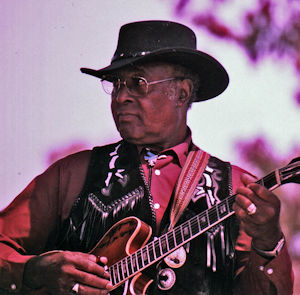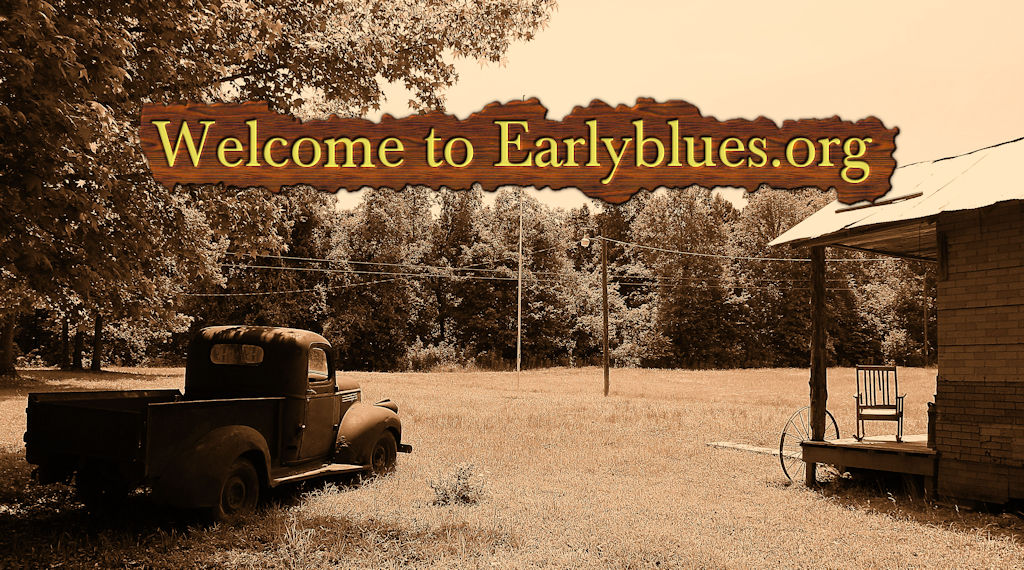‘Phillip Walker Obituary’ – by Keith Woods, from Tales From The Woods
 Tales From The Woods belatedly raises a glass to blues singer and guitarist, the wonderful Phillip Walker who died unexpectedly and suddenly of heart failure at the age of 73 upon 22nd July 2010.
Tales From The Woods belatedly raises a glass to blues singer and guitarist, the wonderful Phillip Walker who died unexpectedly and suddenly of heart failure at the age of 73 upon 22nd July 2010.
Phillip Walker was a hugely respected and highly influential musician amongst his peers, but sadly never crossed over to the Blues buying fans to allow him the acclaim and status he so richly deserved, forcing him to remain very much a cult artist throughout his long and varied career which no doubt allowed him a comfortable living but never to move in to the top drawer bracket which he so richly deserved.
Veteran TFTW contributor and Blues fan Shaky Lee Wilkinson and I were privileged to witness this versatile guitarist and singer in action a few times during what is now generally considered to be the golden decade for true blues at London’s 100 Club, the final decade of the last century. Always immaculately turned out in three piece suits, shirt and tie, his appearance at least contradicted the image of a down at heel blues musician. A powerful singer blessed with a rich and expressive tone, guitarist of both flair and imagination, overall a performer of intelligence. We used to say that surely it is just a matter of time before he cracks it, soon to be lauded alongside Buddy Guy, B.B.King, John Lee Hooker etc. Sadly it would remain never to be in life and, as yet, neither in death.
Born one of 12 children, of which he was the seventh to arrive upon 11th February 1937, the small south Louisiana hamlet of Welsh was his birthplace and home through to encroaching teenage years when the family moved over the state line to Port Arthur, Texas, where it was he first took an interest in the guitar. By his mid-teens he had already turned professional, his playing graduated to such a degree of excellence he was soon to find a home in the band of local musician Lonesome Sundown (the pair would be reunited for a while during the seventies), before jumping ship to Lonnie Brooks, and again a while later to the man whose name would become legendary, that of Louisiana’s rich musical heritage and synonymous with Zydeco, Clifton Chenier with whom Walker made his first recordings, before moving on yet again to join the rough tough road-house circuit of West Texas and New Mexico in company of guitarist Long John Hunter.
Releasing a debut single under his own name in the final months of the 1950s, Hello My Darling which, despite doing good business in the confines of the blues market, did not lead to more and better things recording wise. A couple of decades would have to pass before his name appeared on vinyl.
Come the birth of the sixties he left his southern home behind and headed out west. Settling in Los Angeles, spending the best part of a decade gigging around southern California, cutting some sides with his wife Ina Beatrice Gilkey, a singer known professionally as Bea Bop, which would later find a wider audience when released on an album The Bottom Of The Top [1973]. The final year of the sixties he would step into the shoes occupied by such luminaries as Travis Wamack, Dewey Terry, Jimi Hendrix to name but three, when he took up a position in the band of the legendary Georgia peach Rock’n’Roll legend, Little Richard. It was around this period he had a chance meeting with the producing and song writing team of Bruce Bromberg and Denis Walker. Soon an artistically fruitful association would greet the three man collaboration as the decade of the seventies moved forth, the aforementioned The Bottom Of The Top released on the short lived Playboy label, amazingly an off-shoot of the magazine of the same name.
Someday You’ll Have These Blues was released in 1977 on the Joliet label, along with being a long-time favourite of this particular blues fan, considered by many to be one of his finest efforts and a creative highlight of the three man team, the many facets of his diverse repertoire on display, from the blues-soul of Part Time Love, Breaking Up Somebody’s Home to low down rough and hewn blues in the shape of Beaumont Blues. The same year saw him providing contributions on his former boss’s, Lonesome Sundown, critically acclaimed come-back album Been Gone Too Long, this too the end result of a Bromberg, Wilson and Walker creation. The Blues Show Live At Pits Inn [1980] along with a couple of albums on Rounder label From L.A To L.A [1982] and Tough As I Want To Be [1984] were no doubt useful in gaining him a wider audience, his achievements sadly vastly over shadowed by another Bromberg-Wilson artist with his smooth, relatively sophisticated urban modern soul blues, Robert Cray, who scored international success that Walker could only dream of. He continued to do what he had done for the three decades prior, gigging, now taking on many European tours where he would find a loyal and keen following, recording in 1992 with our home grown giant of the Blues, Otis Grand, the results being issued on JSP label as Big Blues From Texas [1992].
The 1990s would see him successively signed to Black Top, Alligator and MC Records, which produced albums such as Working Girl Blues [1995], I Got A Sweet Tooth [1998], the following year saw him teaming up with his old buddies Long John Hunter and Lonnie Brooks for the Lone Star Shootout album which deservedly won a blues music award. Next up another live album, this time recorded at Biscuits and Blues club in San Francisco, entitled rather predictably The Phillip Walker Big Band Live At Biscuits and Blues. His final label would prove to be with Delta Groove Records, his final solo outing Going Back Home [2007] while two years later his name would appear on recordings made at the company’s All Star Blues Review.
Keith Woods

